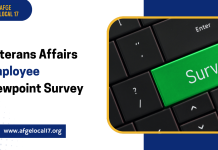Concerns About VA Investigatory Records Transparency and VA’s Harassment Prevention Program
A letter from Alma L. Lee, President of the AFGE National Veterans Affairs Council, #53 to Secretary Denis McDonough of the Department of Veterans Affairs (VA), addresses significant concerns about the VA’s harassment prevention program and equal employment opportunity (EEO) policies. The letter criticizes the VA’s recent proposed rulemaking, which allegedly seeks to exempt the agency from disclosing investigatory records related to harassment complaints. Lee argues that this lack of transparency undermines trust and fails to protect the integrity of the investigative process, raising serious questions about VA Investigatory Records Transparency.
Impact of the Proposed Rulemaking on VA Investigatory Records Transparency
Lee highlights that the VA’s approach is counterproductive, especially in light of recent sexual harassment issues within the VA’s EEO office and recommendations from the Government Accountability Office (GAO) and Congress for improved processes and organizational structure. The letter also points out that the VA has failed to comply with the Elijah Cumming Act, which mandates that the EEO department head reports directly to the Secretary and that the EEO program must be structurally independent from the Agency’s Human Resources and General Counsel offices. This failure further complicates the issue of VA Investigatory Records Transparency, as the organizational structure directly impacts the transparency of investigatory records.
The Need for Transparent Processes in the VA’s Harassment Prevention Program
The letter further criticizes the VA’s Harassment Prevention Program (HPP), noting that it is poorly distinguished from the EEO process and lacks clear procedures and transparency. Lee urges Secretary McDonough to reconsider the EEO organizational reporting structure, enhance transparency, and ensure that the VA adheres to the principles it advocates, particularly regarding the “No FEAR” requirements. Emphasizing VA Investigatory Records Transparency is crucial to restoring confidence in these programs.
Restoring Trust Through Enhanced VA Investigatory Records Transparency
In summary, the letter calls for more face-to-face training, separation of ORMDI functions from HR and General Counsel, and a reassessment of the VA’s current policies to restore trust and ensure fair, objective, and impartial investigations within the agency. Alma Lee’s advocacy for VA Investigatory Records Transparency highlights the necessity of transparent processes to maintain the integrity of the VA’s investigative functions.
To view the text of this letter, please continue reading below. To download a copy of the letter, please click the button at the bottom of the page.
June 27, 2024
The Honorable Secretary Denis McDonough 810 Vermont Ave NW
Washington, DC 20420
Dear Secretary McDonough,
I am writing to you to request a written explanation behind the basis of your decision making in the area of harassment prevention program and equal employment opportunity (EEO) policies and procedures of the VA. Last week, unions, including AFGE, received a copy of VA’s proposed rulemaking for VA 203VA08 prior to its publication. Although AFGE submitted a public comment, vigorously disagreeing with the Agency in the federal register personnel and policy makers within the Office of Resolution Management, Diversity and Inclusion (ORMDI), continues with a ludicrous position of secrecy regarding the VA harassment prevention policy and its associated records.
It seems rather than advocating for transparency of disclosing these records, other than to VA managers themselves, VA is attempting to isolate itself to avoid potential EEO liability. This will and does create the exact opposite effect of the required transparency needed for a harassment prevention program to be successful. This will not secure the employees’ trust in alleviating harassment and reprisal activities within the Agency. Very simply, the Agency’s new rule proposes to exempt itself from disclosing investigatory records, as well as investigatory techniques, to all parties involved, including alleger, alleged harasser, witnesses, representatives, union officials and other individuals. Notably, management officials would have full access to these records.
It is obvious the Agency’s only aim is to continue with this vein of non-transparency and conflicts of interests, to maneuver, manipulate, or obscure information or data to its advantage, rather than protect the integrity of its investigative protocols. This ill-advised change ignores recent news reports concerning sexual harassment issues within the Agency’s EEO office itself, two (2) Government Accountability Office (GAO) reports, and Congressional hearings that suggested VA must improve both its processes and organizational structure, follow the law, and improve employees’ trust in reporting, avoid perceptions of conflicts of interest associated with “No FEAR” requirements.
As far back as 2020, the EEOC notified VA that due to a conflict of interest concerning the location of
ORMDI within Human Resources and Administration/ Operations, Security, and Preparedness (HRA/OSP), that VA has a critical deficiency.
VA has also failed to comply with the Elijah Cumming Act’s legal requirements, found in Section 401- 403, which passed in 2020. Instead, VA has alleged a confusion of VA functions under 38 USC 516 and other nonsensical excuses.
The law requires the EEO Department head to report to you directly. Moreover, Section 401, of the Act prohibits the EEO program from being “under the control, either structurally or practically, of the Agency’s capital office of human Capital or office of General Counsel.” Despite this being brought up on 3 separate occasions, via priority action, under a GAO report, via a congressional letter of Congressional leader by Rep Nick Pappas, and legal requirement of the law itself. For whatever reason, despite the recent drama the Agency is still resistant to comply.
Additionally, Part G of the MD-715 plan requires the Agency to create procedures to address harassment allegations that are separate from the EEO complaint process. Yet, the alleged in practicality cannot easily distinguish the different programs (EEO and HPP) as they report to personnel utilizing the same office space as EEO, report utilizing the same phone number as EEO, and the notice of communication to the complainant distinguishing the different programs, EEO versus HPP, is not listed, in VA policy 5979, Or in VHA Directive 5019.02.
Therefore, I do not support the Harassment Prevention Program in VA in its current format. Until you do more face-to-face training involving employees, union and management, as well as separate the functions of ORMDI completely from HR and General Counsel, I fear we are going to have continued real problems. The process should be streamlined under the Office of Resolution management, with the exception of the law enforcement function. I think you need to stop, and re-think the EEO organizational reporting structure, who is allowed to have what information, and understand why transparent, fair, objective and impartial investigations is a good practice. Most important, Mr.
Secretary, you need, and we all need, to live the gospel you are so-called preaching, regarding “No FEAR” requirements.
Thank you, I hope you heed my advice. Sincerely,
Alma L. Lee President
National Veterans Affairs Council, #53
American Federation of Government Employees, AFL-CIO






It’s no wonder that the very office that is charged with protecting employees is embroiled in it’s very own sexual harassment investigation and employees are subjected to such humiliating and degrading treatment. It’s inexcusable that a public servant would allow this to continue.